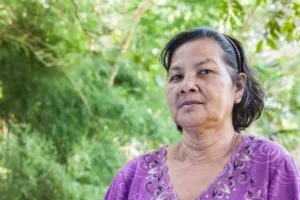By Josh Butterworth. Josh is Impact Teaching’s Thailand Program Coordinator, and he lives in Thailand.
 Welcome to a new series where I delve into Thai culture as a Westerner who has lived in the Kingdom for over one and a half years. But before I get into it, let me please preface my words by saying I am not in any way a representative of UK or Western culture as a whole, nor have I experienced Thai culture in its entirety. I am simply a man has who spent most of his life in one place, who has now started a new life in another. I have met many people in my twenty-eight years on this planet and have had both meaningful and insignificant relationships in both the UK and Thailand, it is from those experiences that I will be drawing from to give you some insight into how two cultures halfway across the world differ from one another.
Welcome to a new series where I delve into Thai culture as a Westerner who has lived in the Kingdom for over one and a half years. But before I get into it, let me please preface my words by saying I am not in any way a representative of UK or Western culture as a whole, nor have I experienced Thai culture in its entirety. I am simply a man has who spent most of his life in one place, who has now started a new life in another. I have met many people in my twenty-eight years on this planet and have had both meaningful and insignificant relationships in both the UK and Thailand, it is from those experiences that I will be drawing from to give you some insight into how two cultures halfway across the world differ from one another.
And I would like to make one more point before I start. When I first arrived in Thailand many years ago, a mysterious land full of culture and history, I was warned to watch out for several things. Small cultural differences that may be acceptable in the West but don’t go down well in the Land of Smiles. A few examples of these relate to the notion in Thailand that the head is the most sacred part of the body, and that the feet are dirty and unimportant. Because of this I was told never to touch children on the head, nor to put my f oot up on my knee when I sat, and so on. There are more.
I have witnessed these rules being broken numerous times all across the country by a wide range of different people, all Thai. Although I am not advising you to go out and break them yourself, and it is important to learn about and respect small cultural differences like these, I want to make you aware that they are not as significant as you may think. Instead, it is my goal to enlighten you on some more nuanced cultural differences that are likely to affect you as you develop serious relationships with Thai people during your time here. If you are ready, let’s get started with the first and possibly most significant cultural observation, saving face.
The idea of saving face is something most people in almost every culture across the world have some notion of, but in Asia it plays a far greater role in people’s daily lives and comes in a different form than in the West. I first became familiar with the term when I moved to China in 2019, people told me to prepare for the ‘saving face’ culture, but it never really showed itself to me in any clarity. It’s only since I have been living in Thailand that I have seen the real significance of its impact.
When I say saving face you may think of someone trying to avoid minor embarrassment or an awkward situation. The same can be applied to Thailand but is only the tip of the iceberg. Essentially, saving face restricts people from showing their true emotions due to the idea that it displays weakness, that in the past may have led to social rejection. The whole phenomenon of saving face is deeply rooted in cultures of the past, people may not understand why they are still influenced by them in the 21st century but they very much are.
From my experiences in the UK, instances of people displaying extreme emotion are very common. Whether that comes in the form of road rage, moping around the office after a bad commute, or during an argument with a partner that ends with over-the-top apologising and endless love being expressed for one another. Of course this all happens in Thailand at some point or another, but it is incredibly uncommon.
I can expresses this point perfectly with a firsthand experience I had when I worked at a school in Phetchabun. There was one Thai teacher who was in an abusive relationship, she was very happy to tell us all about it out of work, but she was always smiles and positivity when she stepped across that white line. I knew how bad her situation was and couldn’t believe how she held it together in front of colleagues and students. The one contradiction is that she would pour out her emotions to us, a group of Western teachers, but that might have been exactly the reason. She couldn’t go to anyone else. I imagine that most people in the UK or the West who were in a similar position to this woman would not feel the need or compulsion to hide their emotions, and would hopefully seek help. It’s debatable whether saving face resulted in a good or bad outcome in this instance but it is just the way it is.
 The last example is extreme. In my relationships I have noticed smaller and more subtle examples of saving face that do take some getting used to. If I had to simplify it I would say that Westerners are not afraid to show their emotions, whereas Thais generally keep on a steady emotional level regardless of good or bad situations. This can come across as uninterest, ungratefulness, a lack of remorse, a lack of caring or just general apathy. I can promise you this is not how they are really feeling, but don’t expect them to tell you the truth when you ask them, if they have chosen to save face then that is what they are going to do. I had naively thought that instances of saving face would reduce as I got closer with people, but in fact the opposite happened, saving face seems to become even more important when it relates to someone they really care about.
The last example is extreme. In my relationships I have noticed smaller and more subtle examples of saving face that do take some getting used to. If I had to simplify it I would say that Westerners are not afraid to show their emotions, whereas Thais generally keep on a steady emotional level regardless of good or bad situations. This can come across as uninterest, ungratefulness, a lack of remorse, a lack of caring or just general apathy. I can promise you this is not how they are really feeling, but don’t expect them to tell you the truth when you ask them, if they have chosen to save face then that is what they are going to do. I had naively thought that instances of saving face would reduce as I got closer with people, but in fact the opposite happened, saving face seems to become even more important when it relates to someone they really care about.
If you are a Westerner reading this then I’m sure you can empathise with the frustrations that saving face may cause in Thailand. It can be difficult at points, I won’t lie to you. But once you are aware of it and can come to accept it then you can move past it to a place where you can make progress in your life and in relationships. There are in fact many things that Westerns could take from the saving face culture, but regardless of whether it’s a good or bad thing, you will face it in Thailand and must deal with it. You can’t change it and it is part of what makes this country such a beautiful and unique place, full of friendly and considerate people. I wouldn’t want it any other way, it is just another part of the rich tapestries that makes our world such as wonderful place.
If you want to start a cultural adventure as a teacher in Thailand then learn more about our programs in the country here, we have school ready for you in the mountains of the north to the beaches of the south. Join us in exploring this wonderful place.
Or email me, Josh, with any questions at josh@impact-teaching.com




